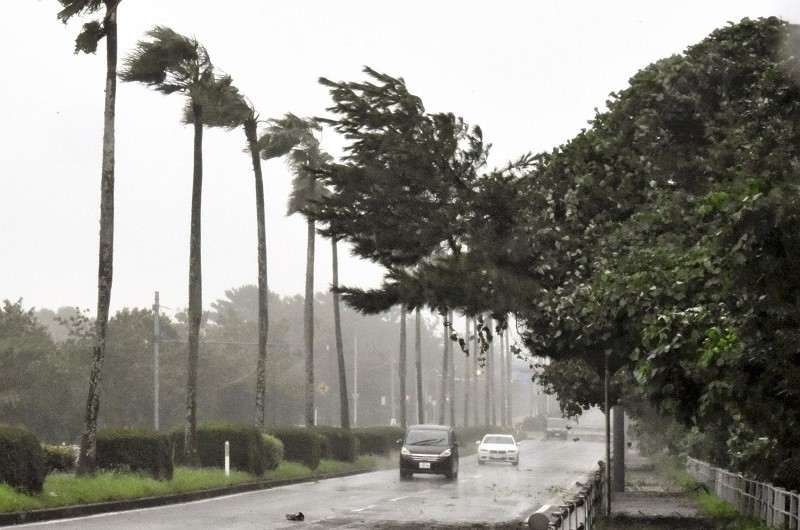Typhoon No. 14 pounds Japan; 2 people confirmed dead

Gusting winds from Typhoon No. 14 blow trees in Miyazaki on Sunday.
8:01 JST, September 20, 2022
Tokyo, Sept. 19 (Jiji Press)—Large Typhoon No. 14 has pounded many parts of Japan, leaving two people dead, one person missing and more than 50 others injured.
The 14th typhoon of the year moved northeast around Yamaguchi Prefecture in western Japan and along the coast of the nearby Sanin region toward Monday night after traveling through the Kyushu southwestern region from Sunday night to Monday morning.
Typhoon No. 14, which is no longer extremely powerful, is forecast to head for the Tohoku northeastern region Tuesday morning. It is expected to become an extratropical cyclone Tuesday afternoon.
The Japan Meteorological Agency put people in wide areas on high alert for violent winds, high waves and high tides, as well as landslides and river flooding from heavy rain.
The agency downgraded its special warnings for strong winds, high waves and high tides issued on Saturday evening in Kagoshima Prefecture in Kyushu to warnings or advisories or lifted them by 8 a.m. Monday (11 p.m. Sunday GMT). A special heavy rain warning issued for most areas in Miyazaki Prefecture, also in Kyushu, was lowered to a warning at 11 a.m. Monday.
“It is really raining heavily,” Ryuta Kurora, director at the agency’s Forecast Division, told a press conference, urging people not to lower the guard since landslides could happen some time after the rain stops.
In the city of Miyakonojo in Miyazaki, a 68-year-old male corporate worker was confirmed dead after being found in a submerged vehicle. In the town of Mimata in the same prefecture, a 41-year-old man died in a landslide.
An 82-year-old man went missing after going out to check a chicken farm in the city of Hatsukaichi in Hiroshima Prefecture in the Chugoku western region.
Three people in Saga Prefecture in Kyushu, and one each in Miyazaki, Oita Prefecture, also in Kyushu, and Ehime Prefecture in the Shikoku western region were seriously injured, according to the Fire and Disaster Management Agency. Fifty-one people in the Chugoku, Shikoku and Kyushu regions suffered slight injuries.
As of Monday morning, about 560,000 people from some 270,000 households in Kyushu were urged to take actions immediately to protect their lives. Evacuation orders were issued for roughly 9.16 million people from about 4.3 million households in western Japan.
A linear precipitation zone, or a band of cumulonimbus clouds that causes especially heavy rain, could be formed in the Tokai central region on Tuesday.
The government held a meeting of related ministers to deal with the typhoon at the prime minister’s office in Tokyo.
Prime Minister Fumio Kishida called on people to avoid unnecessary outings and obtain up-to-date weather and evacuation information.
Noting that flooding and landslides have occurred in many places and that dozens of people have been injured, Kishida urged ministries and agencies concerned to send necessary personnel to affected areas quickly.
At 10 p.m. Monday, Typhoon No. 14 was traveling east-northeast over the Sea of Japan some 100 kilometers north-northwest of the city of Maizuru in Kyoto Prefecture, part of the Kinki western region, at a speed of 35 kilometers per hour. With a central atmospheric pressure of 980 hectopascals, the typhoon had a maximum wind speed of 30 meters per second and a maximum instantaneous wind speed of 40 meters per second, according to the meteorological agency.
The city of Shikokuchuo in Ehime recorded a maximum instantaneous wind speed of 47.4 meters per second around 1:55 a.m. Monday.
In the city of Higashikagawa in Kagawa Prefecture, located Shikoku, rainfall in the hour until shortly after 4 a.m. reached 60.5 millimeters.
In the town of Misato in Miyazaki, the amount of rain between midnight Wednesday, when it started, and 4 p.m. Monday totaled 985 millimeters.
On Tuesday, the maximum instantaneous wind speed is forecast to reach 40 meters per second in Chugoku and the Hokuriku central region, and 35 meters in Tokai, Kinki, Shikoku, Tohoku, the northernmost prefecture of Hokkaido, the Kanto eastern region and the Koshin central region.
The maximum wave height is estimated at 8 meters in Kinki and Chugoku, 7 meters in Tokai and northern Kyushu, and 6 meters in Hokkaido, Tohoku, Kanto and Hokuriku.
In the 24 hours to midnight Tuesday, rainfall is forecast to total up to 200 millimeters in Tokai, up to 150 millimeters in Tohoku, Kanto, Koshin and Hokuriku, up to 120 millimeters in Hokkaido and up to 100 millimeters in Kinki.
Typhoon No. 14 disrupted public transport services mainly in western Japan.
Kyushu Railway Co. , or JR Kyushu, canceled all train operations in its service areas, including the Kyushu Shinkansen bullet train line, on Monday.
For the Sanyo Shinkansen Line, the section between Hiroshima Station and Hakata Station was suspended all day while services on the section between Shin-Osaka Station and Hiroshima were gradually halted toward Monday evening.
On Tuesday, the Kyushu and Sanyo Shinkansen lines are expected to resume normal operations from the first trains.
For the Tokaido Shinkansen Line, the end of Monday’s services was moved up substantially on the section between Shin-Osaka and Nagoya Station, with the day’s last train departing from Shin-Osaka before 5 p.m. The number of trains was reduced between Tokyo Station and Nagoya.
According to Central Japan Railway Co. , or JR Tokai, the operator of the Tokaido Shinkansen Line, substantial delays are expected from the first trains on the line on Tuesday. Services may be canceled for some trains while the destinations may be changed for others, JR Tokai officials said.
Japan Airlines canceled 463 flights, mainly those to and from western Japan regions, on Monday. All Nippon Airways canceled 383 flights.
On Tuesday, JAL and ANA plan to cancel 43 and 24 flights, respectively, mainly those departing from airports in western Japan, including Kansai International Airport in Osaka Prefecture, in the morning.




